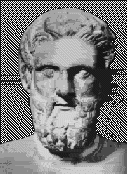
Today's intellectual landscape in the U.S. is a barren place, dominated by the static epistemology of Aristotle, a place where Thomas Hobbes demands that metaphor be outlawed, and Lord Bertrand Russell insists that science be banned, and replaced with mathematical formalisms. To top it all off, Time magazine would have us believe that computers can mimic human reason.
The poets of Greek antiquity understood something about what the human mind really can do, including the employment of humor and irony.
What follows are some choice excerpts from The Frogs, by Aristophanes. The scene is the underworld, where the God Dionysius and his slave Xanthias are visitors, and Aeacus is the house porter to Pluto. I hope this motivates you to seek out and read the entire play.
XAN. ... Tell me by Zeus, our rascaldom's own god,
What's all that noise within? What means this hubbub
And row? AEAC. That's Aeschylus and Euripides.
XAN. Eh? AEAC. Wonderful, wonderful things are going on.
The dead are rioting, taking different sides.
XAN. Why, what's the matter? AEAC. There's a custom here
With all the crafts, the good and noble crafts,
That the chief master of his art in each
Shall have his dinner in the assembly hall,
And sit by Pluto's side. XAN. I understand.
AEAC. Until another comes, more wise than he
In the same art: then must the first give way.
XAN. And how has this disturbed our Aeschylus?
AEAC. 'Twas he that occupied the tragic chair,
As, in his craft, the noblest. XAN. Who does now?
AEAC. But when Euripides came down, he kept
Flourishing off before the highwaymen,
Thieves, burglars, parricides -- these form our mob
In Hades -- till with listening to his twists
And turns, and pleas and counterpleas, they went
Mad on the man, and hailed him first and wisest:
Elate with this, he claimed the tragic chair
Where Aeschylus was seated. XAN. Wasn't he pelted?
AEAC. Not he: the populace clamoured out to try
Which of the twain was wiser in his art.
XAN. You mean the rascals? AEAC. Aye, as high as heaven!
XAN. But were there none to side with Aeschylus?
AEAC. Scanty and sparse the good, (regards the audience) the same as here.
XAN. And what does Pluto now propose to do?
AEAC. He means to hold a tournament, and bring
Their tragedies to the proof. XAN. But Sophocles,
How came not he to claim the tragic chair?
AEAC. Claim it? Not he! When he came down, he kissed
With reverence Aeschylus, and clasped his hand,
And yielded willingly the chair to him.
But now he's going, says Cleidemides,
To sit third man: and then if Aeschylus win,
He'll stay content: if not, for his art's sake,
He'll fight to the death against Euripides.
XAN. Will it come off? AEAC. O, yes, by Zeus, directly.
And then, I hear, will wonderful things be done,
The art poetic will be weighed in scales.
XAN. What! weigh out tragedy, like butcher's meat?
AEAC. Levels they'll bring, and measuring-tapes for words,
And moulded oblongs. XAN. Is it bricks they are making?
AEAC. Wedges and compasses: for Euripides
Vows he'll test the dramas, word for word.
[the next excerpt is the climax of the contest -- Dionysius is the referee:]
DIO. Enough of both your odes. AESCH. Enough for me.
Now would I bring the fellow to the scales.
That, and that alone, shall test our poetry now.
And prove whose words are weightiest, his or mine.
DIO. Then both come hither, since I needs must weigh
The art poetic like a pound of cheese.
CHOR. O, the labour these wits go through!
O, the wild, extravagant, new,
Wonderful things they are going to do!
Who but they would ever have thought of it?
Why, if a man had happened to meet me
Out in the street, and intelligence brought of it,
I should have thought he was trying to cheat me;
Thought that his story was false and deceiving.
That were a tale I could never believe in.
DIO. Each of you stand beside his scale, AESCH/EUR. We're here.
DIO. And grasp it firmly whilst ye speak your lines,
And don't let go until I cry "Cuckoo."
AESCH/EUR. Ready! DIO. Now speak your lines into the scale.
EUR. "O, that the Argo had not winged her way--"
AESCH. "River Spercheius, cattle-grazing haunts--"
DIO. Cuckoo! let go. O, look, by far the lowest
His scale sinks down. EUR. Why, how came that about?
DIO. He threw a river in, like some wool-seller
Wetting his wool, to make it weigh the more.
But you threw in a light and winged word.
EUR. Come, let him match another verse with mine.
DIO. Each to his scale. AESCH/EUR. We're ready. DIO. Speak your lines.
EUR. "Persuasion's only shrine is eloquent speech."
AESCH. "Death loves not gifts. alone amongst the gods."
DIO. Let go, let go. Down goes his scale again.
He threw in Death, the heaviest ill of all.
EUR. And I Persuasion, the most lovely word.
DIO. A vain and empty sound, devoid of sense.
Think of some heavier-weighted line of yours,
To drag your scale down: something strong and big.
EUR. Where have I got one? Where? Let's see. DIO. I'll tell you.
"Achilles threw two singles and a four."
Come, speak your line: this is your last set-to.
EUR. "In his right hand he grasped an iron-clamped
mace."
AESCH. "Chariot on chariot, corpse on corpse was
hurled."
DIO. There now! again he has done you. EUR. Done me? How?
DIO. He threw two chariots and two corpses in;
Fivescore Egyptians could not lift that weight.
AESCH. No more of "line for line"; let him -- himself,
His children, wife, Cephisophon -- get in,
Two lines of mine shall overweigh the lot.
--- from a translation by B.B. Rogers, published in the Harvard Classics by
P.F. Collier and Son, New York.